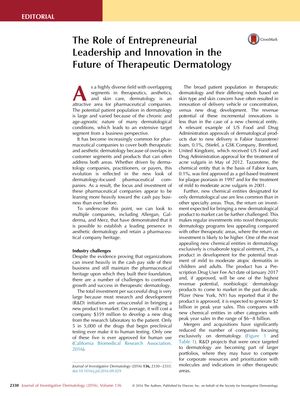The Role of Entrepreneurial Leadership and Innovation in the Future of Therapeutic Dermatology
November 2016
in “
The journal of investigative dermatology/Journal of investigative dermatology
”

TLDR Entrepreneurial companies are key to advancing dermatology treatments and patient care.
The article from December 2016 discusses the significant challenges in therapeutic dermatology innovation, particularly the high costs and risks of drug development, with an average cost of $359 million for a new drug and a success rate of only 1 in 5,000 drugs from preclinical stages reaching human testing. It points out that incremental innovations are more common than new drug developments due to lower potential revenues and that the trend of mergers and acquisitions may lead to a decreased focus on novel dermatological therapies. However, the article emphasizes the importance of smaller, entrepreneurial companies in driving innovation, especially for unmet needs and rare skin diseases, and concludes that a strong relationship between dermatology professionals and the industry is essential for advancing treatment options and patient care.


